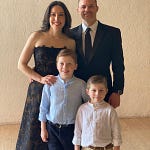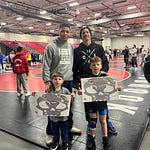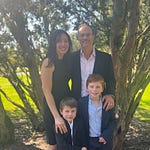🔥Welcome to Volume #00089!🔥
I’m Christian Champ. This is ☯️The Middle Way Newsletter ☯️. It is a place where I write, explore, share, and invite you along for the journey.
If you enjoy the newsletter, please share it with your friends.
🌱Why We Need to Plant Seeds to Find Our Best Lives and Help Create the Best Lives for Those Around Us🌱
Am I planting enough seeds?
That question rattled around in my mind while biking my son to bouldering camp this morning.
The summer camp approach revolves around planting seeds to see what grows for him in the future.
His experience is doing awesome activities and learning new things with new friends.
Camps allow us to face challenges in a safe environment and find activities for the future.
They let us plant seeds.
Are we doing that well for ourselves?
Are we setting ourselves and the people in our lives up to plant, cultivate, and harvest those seeds?
Once you learn to boulder, flip, or program, you don't unlearn that process. You know you can grow that skill set.
The challenge we face is ensuring we spend time planting and nurturing. Nurturing is the getting comfortable being uncomfortable part of the game.
We don't know what the seeds grow into, but by watering and caring for them, opportunities emerge.
When we plant seeds, we create possibilities for ourselves and others.
Our seeds can be books, ideas, people, or skills. We can center it around an idea we want to explore or people we want to explore with.
We also get to plant seeds for others. We can introduce ideas or skills. We can connect people that need to meet each other! We can encourage a friend or colleague's strength to see where it leads them.
What happens when you let someone know they have a talent that you can help cultivate for them? What happens when we spend time mentoring folks? What happens when we pass the ball to colleagues to allow them to take their shot and get some practice?
Halfway through the year is a great time to take inventory of our seeds with these questions:
What seeds do we want to cultivate?
What seeds are we growing and harvesting?
What do we need to focus on developing and nurturing?
What seeds do we want to ignore?
What seeds do we need to play with?
What experimental seeds do we want to put in the background and see what grows?
How do we want to help others cultivate and harvest their seeds?
📓Things to Think About📓
The Happiness Lottery by Rob Henderson
We all want to be happy, content and fulfilled. We want to find joy in our lives. Rob breaks down the ways that we can find happiness by nurturing our community and the people in our lives.
It’s not money that drives our happiness, but our actions and relationships.
Giving people a bunch of money isn’t suddenly going to improve their lives. But since highly-educated people primarily understand value in terms of dollars, it’s worth noting the following:
-In terms of the effect on happiness, having a friend you see regularly is worth $100,000 a year
-Being married is also worth $100,000
-Seeing your neighbor regularly is worth $60,000
-Other research suggests that income doesn’t have a lasting increase on happiness because people usually adapt to money. In contrast, marriage, family, and health have lasting increases on happiness and are immune to hedonic adaptation.
-Compared with not attending any religious service, attending a religious service once a week has the same effect on happiness as moving from the bottom to the top quartile of the income distribution
A poor person with a spouse, a close friend, a relationship with a neighbor, and who attends a religious service can achieve the same level of happiness as an affluent upper middle class person.
Steven Johnson writes about the Natural Magic of Disney
Characters from books and movies feel like magic. This reminded me of how when you learn things like juggling, skateboarding or giving a pitch or presentation, it can feel like magic. A thing that seemed impossible, not only becomes possible but we get better and better at doing it.
Disney is the magic of illusion, but going from not being able to juggle to juggling feels like a similar illusion.
You can make the argument that the single most dramatic acceleration point in the history of illusion occurred between the years of 1928 and 1937, the years between the release of Steamboat Willie, Disney’s breakthrough sound cartoon introducing Mickey Mouse, and the completion of his masterpiece, Snow White, the first long-form animated film in history. It is hard to think of another stretch where the formal possibilities of an artistic medium expanded in such a dramatic fashion, in such a short amount of time.
The magic takes place when the possibility emerges and the phase change happens. It is the same as talking to someone on Facetime for the first time.
Those weeping spectators at the Snow White premiere signaled a fundamental change in the relationship between human beings and the illusions concocted to amuse them. Complexity theorists have a term for this kind of change in physical systems: phase transitions. Alter one property of a system—lowering the temperature of a cloud of steam, for instance—and for a while the changes are linear: the steam gets steadily cooler. But then, at a certain threshold point, a fundamental shift happens: below 212 degrees Fahrenheit, the gas becomes liquid water. That moment marks the phase transition: not just cooler steam, but something altogether different.
Twelve frames per second—the point at which the human eye begins to see motion in a series of static images—is the perceptual equivalent of the boundary between gas and liquid. When we crossed that boundary, something fundamentally different emerged: still images came to life.
My colleague at fassfoward Gavin McMahon writes Why Do We Make It So Complicated?
This is investing rule 101. How do you tell your product’s story as simply and clearly as possible? Then you let the customer lead you as deep as they want to go.
Gavin notes that make things simple we make them easier to understand and digest. When we do this we are serving our customers, colleagues, and clients.
If that executive ran a complex business, simplicity would be an obsession. The number of moving parts may not reduce, and the attention to detail would remain the same, but the effort in navigating work reduces dramatically. This obsession with simplicity is transformative, especially in business transformations. Bob Toohey, CHRO of Allstate, puts it like this, “all transformations are about getting better. They are also about people. That means everything needs to be simple. Life doesn’t get better when we make things harder.”
Make your emails easier to read
Look at the last email you sent.
Ask yourself: would an eight-year-old understand it? Would your significant other? They’re not, I assume, unintelligent people.
But you have probably been lulled over time by Complexity. In a trance, you’re not aware of what you’re doing: Terms of art; Acronyms; Long, run-on sentences.
You might use “weasel words” like the classic “synergy” or “empower.” Or my particular nails-on-chalkboard-er “utilize.”
As we’ve discussed in past issues of The Middle Way, we may want to take things out than always adding things in.
Maeda’s colleague at Everbridge, David Starmer is the Chief Transformation Officer. He advocates, “Instead of trying to ‘add in’ simplicity, you need to actively ‘take out’ complexity.”
Gavin leaves us with three ideas to be less complicated:
Think in Threes - the good old rule of 3
Don’t make people think - deliver from their POV
Write better - or tell better stories


💣Words of Wisdom💣
"Courage is strength in the face of knowledge of what is to be feared or hoped. Wisdom is prudent strength." (Atul Gawande, Being Mortal)
"Really, the key to it is doing what you believe in, as opposed to what you think is going to work. There were never any plans to make | anything happen. I just did what I liked and believed in it, and luckily it all worked out." - RICK RUBIN" (Jake Brown, Rick Rubin)
"The bottom line on culture and grit is: If you want to be grittier, find a gritty culture and join it. If you’re a leader, and you want the people in your organization to be grittier, create a gritty culture." (Angela Duckworth, Grit)
"Status is played to anything, objects as well as people. If you enter an empty waiting-room you can play high or low status to the furniture." (Keith Johnstone, Impro)
"But you have to keep going. You have to take the stairs even if they worry you. Realizing it's a long game rather than a short game helps you to understand the passage of time better." (Questlove, Creative Quest)
"A lot of people give up just before they’re about to make it. You know, you never know when that next obstacle is going to be the last one.” (Jenna Fischer, The Actor's Life)
“You look at where you’re going and where you are and it never makes sense, but then you look back at where you’ve been and a pattern seems to emerge. And if you project forward from that pattern, then sometimes you can come up with something." (Robert M. Pirsig)
"The culture precedes positive results. It doesn’t get tacked on as an afterthought on your way to the victory stand. Champions behave like champions before they’re champions; they have a winning standard of performance before they are winners." (Bill Walsh)
"Working with greater leisure, my ideas become much more 'reasonable and surprise me less." (Brian Eno, A Year With Swollen Appendices)
🙏Thanks for reading🙏
What seeds do you need to plant for the future?
What would you like to cultivate and harvest in the second half of this year?
Any thoughts or comments, please share!
Namaste,
Christian
The best part of work, along with co-creating and doing hard things together, is lifelong friendships. It was great catching up with Pete and Andrew when they rolled through Chicago.
















Share this post